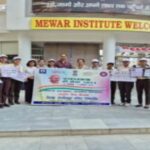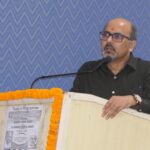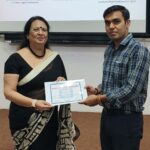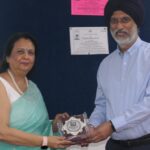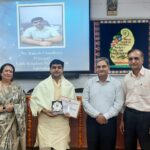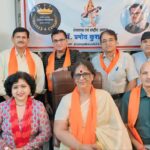
 New Delhi: O.P. Jindal Global University (JGU) and Commonwealth Human Rights Initiative (CHRI) have signed a Memorandum of Understanding (MoU) for close collaboration on human rights issues. The proposed collaboration covers, among other things, internships, fellowships, researcher mobility programmes, joint research, joint workshops, collaborative summer/winter courses for emerging scholars, students and staff, and collaborative executive education courses. An agreement to this effect was signed in New Delhi by JGU’s Centre for Human Rights Studies (CHRS) Executive Director Dr Y.S.R. Murthy and CHRI International Director, Dr. Sanjoy Hazarika. Speaking about the significance of the MoU Executive Director, CHRS, JGU Dr. YSR Murthy remarked, “We are happy to partner with CHRI to create a range of opportunities for our students and researchers in the field of human rights. The signing of MoU is a logical culmination of existing collaboration in the areas of prisons, access to justice, right to information and other areas. We hope it will prove mutually beneficial.” Dr. Sanjoy Hazarika, CHRI International Director, said that the partnership would enable a closer connect between academia and human rights defenders as well as encourage scholarship and research in a critical area that was of increasing relevance but coming under extensive pressure, world-wide, from both State and non-state actors, including corporate. The signing preceded the launch of the ‘Easier Said than Done’ (ESTD) report bought out by CHRI, highlighting the performance of Commonwealth member states at the United Nations Human Rights Council (UNHRC), and to contrast their pledges and voting patterns on human rights issues with conditions in the country. The report was launched for the first time in India, although CHRI has tracked the performance of Commonwealth countries at the UNHRC since the first ESTD report in 2007. In its recommendations, the ESTD Report urged Commonwealth member states to strengthen the special procedure mechanisms of the UNHRC, provide access on requests, and guarantee their independence and impartiality. CHRI further encouraged Commonwealth member states to comply with their reporting obligations to treaty bodies and submit pending reports on time. Describing the importance of the report launched, Mr Wajahat Habibullah, Chairperson of the Executive Committee, CHRI said “This report is simply a kind of a reminder and that is why it is important. It is important that this is documented and taken on record, but it is also more important that those who are concerned with human rights know that these are in fact commitments of those Commonwealth countries because then, these countries can hold themselves accountable.” Speaking at the event, Dr. Y.S.R. Murthy stressed the importance of honouring all voluntary pledges and commitments made by India at the time of its election to the Human Rights Council. Referring to India’s review under universal periodic review third cycle, he expressed deep concern about 98 recommendations made by the Human Rights Council which were merely “noted” by India. He pointed out they included, among others, important recommendations relating to torture, abolition of death penalty, human rights defenders, violence against women, child labour and child marriages. Speakers at the event included former Foreign Secretary Mr. Muchkud Dubey, and the High Commissioner of Fiji, Mr. Yogesh Punja, former Ambassador Mr. T.C.A. Rangachari, Mr. Paul Divakar, General Secretary, National Campaign for Dalit Human Rights and Prof. R. Sudarshan, Dean, Jindal School of Government and Public Policy. There were two panel discussions with human rights activists, diplomats, academics, policy makers and former senior officials on the importance of human rights in light of the ESTD report, the UNHRC and India’s role at the UNHRC.
New Delhi: O.P. Jindal Global University (JGU) and Commonwealth Human Rights Initiative (CHRI) have signed a Memorandum of Understanding (MoU) for close collaboration on human rights issues. The proposed collaboration covers, among other things, internships, fellowships, researcher mobility programmes, joint research, joint workshops, collaborative summer/winter courses for emerging scholars, students and staff, and collaborative executive education courses. An agreement to this effect was signed in New Delhi by JGU’s Centre for Human Rights Studies (CHRS) Executive Director Dr Y.S.R. Murthy and CHRI International Director, Dr. Sanjoy Hazarika. Speaking about the significance of the MoU Executive Director, CHRS, JGU Dr. YSR Murthy remarked, “We are happy to partner with CHRI to create a range of opportunities for our students and researchers in the field of human rights. The signing of MoU is a logical culmination of existing collaboration in the areas of prisons, access to justice, right to information and other areas. We hope it will prove mutually beneficial.” Dr. Sanjoy Hazarika, CHRI International Director, said that the partnership would enable a closer connect between academia and human rights defenders as well as encourage scholarship and research in a critical area that was of increasing relevance but coming under extensive pressure, world-wide, from both State and non-state actors, including corporate. The signing preceded the launch of the ‘Easier Said than Done’ (ESTD) report bought out by CHRI, highlighting the performance of Commonwealth member states at the United Nations Human Rights Council (UNHRC), and to contrast their pledges and voting patterns on human rights issues with conditions in the country. The report was launched for the first time in India, although CHRI has tracked the performance of Commonwealth countries at the UNHRC since the first ESTD report in 2007. In its recommendations, the ESTD Report urged Commonwealth member states to strengthen the special procedure mechanisms of the UNHRC, provide access on requests, and guarantee their independence and impartiality. CHRI further encouraged Commonwealth member states to comply with their reporting obligations to treaty bodies and submit pending reports on time. Describing the importance of the report launched, Mr Wajahat Habibullah, Chairperson of the Executive Committee, CHRI said “This report is simply a kind of a reminder and that is why it is important. It is important that this is documented and taken on record, but it is also more important that those who are concerned with human rights know that these are in fact commitments of those Commonwealth countries because then, these countries can hold themselves accountable.” Speaking at the event, Dr. Y.S.R. Murthy stressed the importance of honouring all voluntary pledges and commitments made by India at the time of its election to the Human Rights Council. Referring to India’s review under universal periodic review third cycle, he expressed deep concern about 98 recommendations made by the Human Rights Council which were merely “noted” by India. He pointed out they included, among others, important recommendations relating to torture, abolition of death penalty, human rights defenders, violence against women, child labour and child marriages. Speakers at the event included former Foreign Secretary Mr. Muchkud Dubey, and the High Commissioner of Fiji, Mr. Yogesh Punja, former Ambassador Mr. T.C.A. Rangachari, Mr. Paul Divakar, General Secretary, National Campaign for Dalit Human Rights and Prof. R. Sudarshan, Dean, Jindal School of Government and Public Policy. There were two panel discussions with human rights activists, diplomats, academics, policy makers and former senior officials on the importance of human rights in light of the ESTD report, the UNHRC and India’s role at the UNHRC.


